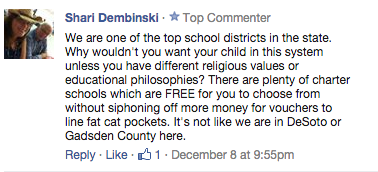Friday Freakout: School Choice is OK Over There, Families Here Shouldn’t Have It
A Sarasota County School Board member spoke out against her own state’s school board association for suing Florida’s Tax Credit Scholarship Program this week in Florida’s Herald-Tribune. She wrote,
We are very fortunate to offer a variety of remarkable programs for our students in Sarasota County. However, at times, what we are offering may not be the right fit for some students.
Her support for school choice baffled many commenters, which brings us to today’s freakout.

And, we agree, most parents probably do want their children in Sarasota County’s district schools. But the likelihood that parents can actually access those schools depends on whether they can afford the average listing price of a home there, which is approximately $479,000. Sarasota County district homes that low-income families might be able to afford—not to mention the homes for which they would have to compete with developers or home flippers—are slim, according to Trulia.com search results. (Admittedly, that is just one opinion. Everyone’s life/income/values are different, so we’ll leave that judgment call up to the individual.) Regardless, a system that distributes education in such a way breeds exclusivity and further separates the “rich” from the “poor.”
Ms. Dembinski also alludes to a point not unfamiliar in suburban districts. A common belief among suburbanites is, “Those other districts are struggling, so I get why people in those districts might need choice. But our district schools are fine. Why would people ever want to leave them?”
For most families, that is indeed the case. But such a statement also acknowledges that we should help families who have needs their schools can’t meet in other districts. And if one accepts that, should they also acknowledge it’s right to help similar families in their own district, if they do indeed exist? More important, recognizing that school choice allows families to leave a district forgets a hugely important second part: School choice allows families to enter a district, too.
Ms. Dembinski went on later in the comment thread to say,
In this school district, we have open school choice and eleven charter schools. Parents can choose where they want to send their child so if their neighborhood school doesn’t suit them, they can choose another school in the district that does. Happens all the time.
It’s true in a state with public school choice, we’d all hope where a child lives no longer matters…but it still does.
Florida has “controlled open enrollment.” The Florida Department of Education website says, “Instead of being assigned to a public school by a school district based on attendance zones, parents may choose a school from anywhere within the district or, if not geographically feasible, from within established zones or boundaries within the district.” So, in short, the district school boards, not the families, still have control. That system zones families to a certain area within their district based on where they live, and families actually aren’t in control of whether their child attends schools outside their district at all.
What that means is parents or future parents still have to worry about their kids’ access to schools when searching for a place to live. A system that yields such a result not only further disadvantages low-income families, but also encourages the concentration of power rather than the equal or fair distribution of it. We find that concept unacceptable in this day and age.
True public and private school choice options are just that, options. They’re just one way to help families, who rightfully are demanding solutions for their children’s struggles in our education system. So again, we ask: If school choice programs are such a bad idea, what alternative solutions are school choice opponents ready to propose for those parents seeking a more suitable environment for their children?




